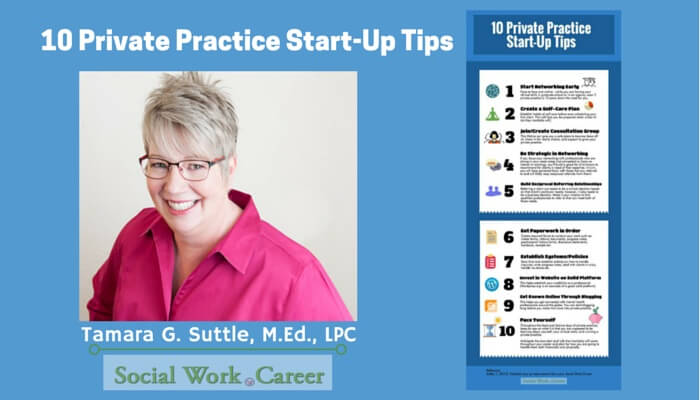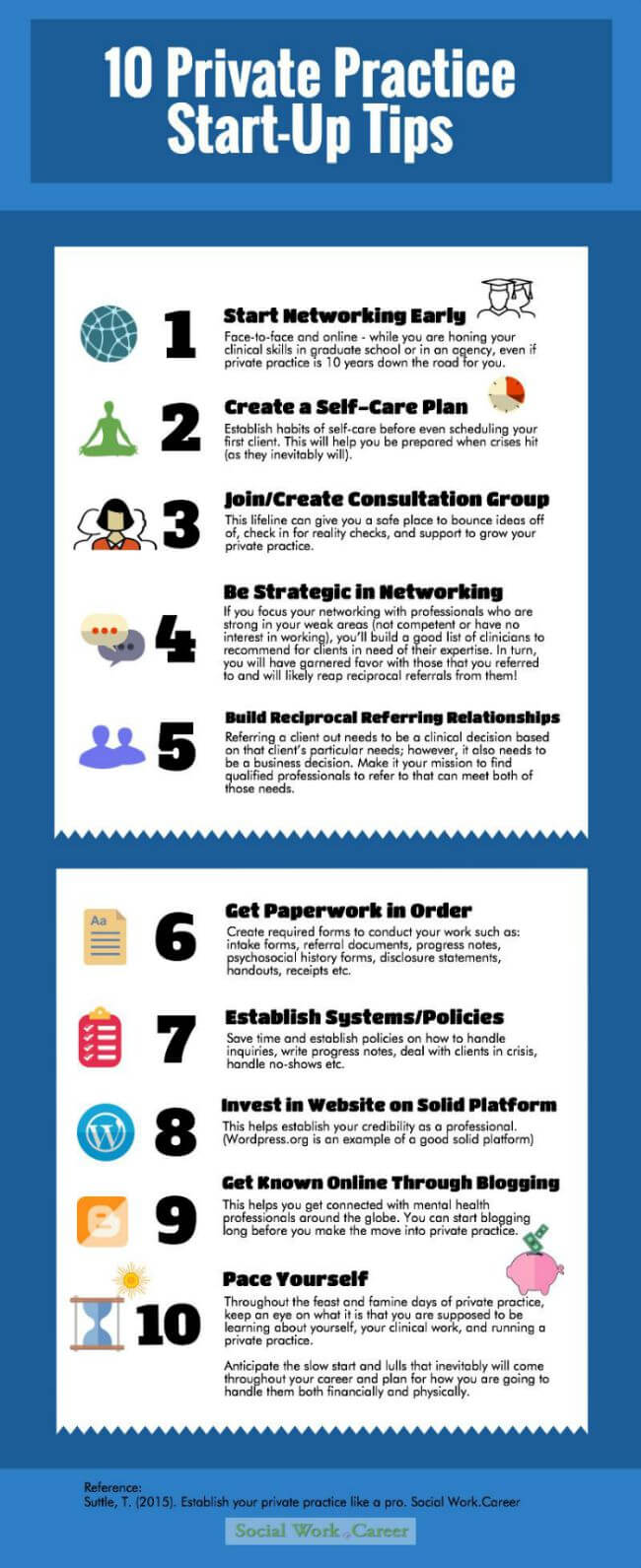Many mental health professionals dream about having their own private practice one day but have no idea of where to begin, or what steps they need to take to prepare for this move.
Today’s post will give you ten critical strategies to help you establish your practice based upon an interview with Tamara G. Suttle, M.Ed., LPC from Private Practice from the Inside out. Tamara is not only a mental health professional with over 20 years of clinical experience in the field, but also a clinical supervisor and private practice coach.
In Establish Your Private Practice Like a Pro, Tamara provided us with guidance on a range of topics from which books to read to build up your clinical and business knowledge to what interview questions you may be asked if you were going to be interviewed for a group practice. She also shared her top 10 tips for professionals wanting to start up their own practice.
Below is an infographic highlighting these key take-aways! Last, but not least, make sure to check out the Tamara’s response following this chart pertaining to establishing your practice in a foreign country!
Tamara’s Top 10 Private Practice Start-Up Tips
Special Added Question for Tamara (from one of Social Work Career’s readers):
Tamara, What would you advise a mental health professional who wanted to establish a private practice in a foreign country where psychotherapy is often seen as unnecessary and patients or clients would rather see a native healer or a physician for assistance?
Off the top of my head, a few things come up:
- Be cognizant of the need for consultation that is culturally competent. That will likely mean that a consultation group here in the USA won’t be sufficient or, possibly even appropriate. Start your search for that support early. Too.
- It is possible that the country may (or may not) have laws dictating who can and cannot provide the types of services that you would like to provide.
- Before attempting to provide mental health services independently, I would recommend that you spend some time working with one of the NGOs, i.e. a local organization that is not part of the government, or a for-profit business. Working in this setting would allow you to build relationships with those in your community, learn some of the social norms, while also doing service work that is meaningful to you.
- As with any practice, you will need to be prepared to handle crises i.e. threats of suicide, homicide, and self-harm, as well as what to do when your clients’ needs surpass your own ability to support them.
- Depending on the country you are located in, it may not be desirable or even possible to have a web presence to market your services. If this is the case, you will need to fall back on traditional networking and marketing practices that were more common throughout the 20th century here in the USA. The good news is that while the tools may differ, the underlying principles of marketing will not – relationships are what build all businesses in the end.
- I do recommend that your initial outreach for clients focus on the expat community to build your clientele. You will likely find that you have more in common with them and will have less of a cultural divide to bridge. Then, as your cultural competence grows, you can begin to integrate your services in a more appropriate way.
- You must also consider the possibility that you will be unable to practice in the same way that mental health professionals are able to in the United States. It may not be legal or sustainable for you to do so in your country.
If that is the case, remember that even then, you still retain all of the skills and talents that you did before. You may simply be required to use them differently. You may be able to practice distance counseling from your country with individuals back here in the USA.
You might be able to leverage your skills into counsulting, coaching, or educational gigs. You might be able to apprentice with natives in order to gain the skills and perspective needed to provide services at a later date. And, I’m sure there area many other possibilities as well.
- My point is that you may need to get creative and think differently about how to use your skills and talents to best serve the population in your country of residence.
Thanks so much, Tamara!
Like this content? Please share it !
What are your thoughts about Tamara’s guidance? Which tip(s) are you going to try to implement right away?




Two additions:
1) Attend your local NASW private practice group for support; it also helps you be accountable for practice building
2) Learn about Insurance reimbursement, because if you decide you want to be an in network provider, it can take up to 4-6 months for the credentialing process.
Thanks so much for stopping by and adding to the conversations, Lori!
These two suggestions sound very wise indeed – to take advantage of NASW’s private practice group as a source of support and information and to become informed about insurance reimbursement.
Thanks again!
Dorlee, I tried to leave a comment here a couple of weeks ago but it looks like it didn’t get approved. I had an out of state conference at the time and may not have hit send, I guess, so trying again and will certainly be promoting this on my own blog and social media, too. So sorry for the delay! Feel free to edit this out of my comment but did want you to know.
Wow! I’m laughing as I look at this post and think I must have talked your ear off for you to be able to pull all of this info together!
Thanks so much for creating this beautiful infographic, too.
It makes it so much easier to access main points rather than simply a wall of text!
I love Lori Tonti’s point about connecting with your professional organizations.
Way too many students grudgingly joined their professional associations as a requirement of their graduate programs and then let their memberships lapse.
No one fights harder for mental health professionals than our professional organizations and there is no better place for social workers, counselors, psychologists, and addictions professionals to put their first hard-earned dollars than back into their professional memberships in these organizations.
Smarter yet, join your professional association and then get involved!
There’s no better way to build your credibility, visibility, and leadership skills (all while furthering your own best interests).
As a Professional Counselor, even I know that NASW, in particular, has paved the way for so many policy changes that make our services available and accessible to millions of people in the USA and around the world.
Tamara,
No worries – How nice to hear from you 🙂
Thanks again for having shared with us some of your valuable learnings and wisdom! It was my pleasure to create the infographic to highlight the key take-aways.
I also love how you expanded upon Lori Tonti’s suggestion of joining a professional association by stressing how it is both a great place for us to give back and build our credibility, visibility and leadership skills!
Best,
Dorlee